Invictus by William Ernest Henley is a powerful poem portraying the fate of human beings. The author clearly is writing about his own struggles for his pain is obvious in the poem. Henley suffered from terrible health problems and also had a child who passed during his own lifetime. Henley encountered many obstacles in his life, some which may have caused others to be defeated. But as the poem Invictus states, Henley had an “unconquerable soul. ” The word Invictus is Latin for unconquered.
Essay Example on Invictus Poem Analysis
Henley wrote the poem so that every other line rhymed. The rhythm of the poem is obvious as the reader is astonished by the powerful lines and message of Invictus. While some aspects of the poem may be understood denotatively, Henley primarily intended for the reader to take the poem connotatively, such as the first line of the poem “out of the night that covers me. ” The first stanza mainly introduces Henley emotionally.
The meaning of “night” in the first line is the representation of Henley’s emotional state and depressing obstacles he overcame individually.
In the third line, he “thanks whatever gods may be” for his “unconquerable soul. ” The fact that he does not address God formally, but rather “gods,” shows that he is not sure what is out there responsible for his unconquerable soul, but for it he is thankful. Even after everything he as an individual had encountered, he had not given up. The next two stanzas reflect how Henley dealt with the pain.
He had “not winced nor cried aloud” meaning publicly he had not dealt with his pain and suffering. The imagery of his head “bloody, but unbowed” is so vivid and clear.
His agony and pain is obvious to an observer, represented by the bloody head, yet he had not given up and had no intentions of giving up on life, represented by his unbowed head. This internal conflict occurred for many years, yet due to his unconquerable soul he is unafraid, as stated in the eleventh and twelfth lines. The final stanza is truly where the metaphors show how only you are responsible for your own fate. Henley states “It matters not how strait the gate, how charged with punishments the scroll”. Basically, it does not matter when you reach the gates of Heaven what you are charged against in the scroll, or Bible.
The last two lines are both metaphors to be taken connotatively, “I am the master of my fate: I am the captain of my soul. ” These two metaphors are essentially the entire meaning of the poem; if you are unconquerable only you can determine your fate. You are the master and captain of your destiny. The tone and mood of the poem and its poet is serious, strong, and deep yet somehow leaves the reader inspired. Disturbingly, this poem was used by Oklahoma City bomber Timothy McVeigh as his last statement before he was executed.
It may be understood then that McVeigh thought only he could determine his fate after his execution. McVeigh is no way felt what he did was wrong, and by giving this poem as his final words only reinforces the statement. He truly understood the poem’s meaning as Henley intended. McVeigh felt justified in his actions, and accepted them. Therefore, he was unconquerable to the society that found him guilty and he would not suffer after his death. He was the captain and master of his fate and soul, at least the way he understood the poem by Henley.
Poems have meanings deep within the lines of the stanzas. A personal story may even sometimes be told without ever blatantly stating it, such as Henley’s health and the death of his child. However, these meanings may be found if one analyzes the poetic devices used by the writer. If a reader read this with a denotative mind set, the true meaning as Henley intended it would not be derived. No matter what one has been through or how one has suffered, one must be unconquerable and responsible for their fate and final destiny.
Invictus Poem by William Henley Analysis. (2019, Nov 27). Retrieved from https://paperap.com/invictus-poem-by-william-henley-analysis/

